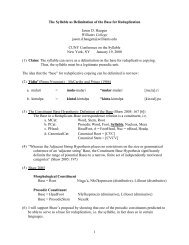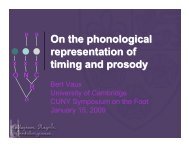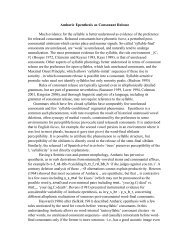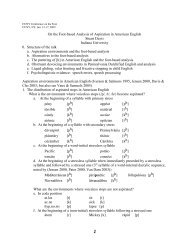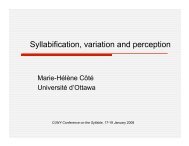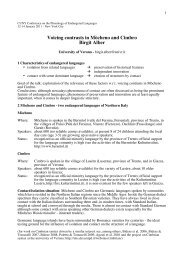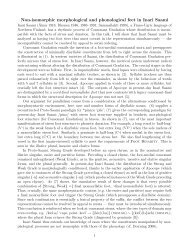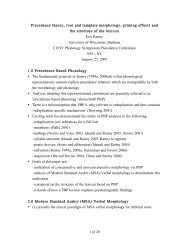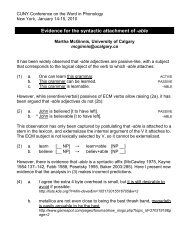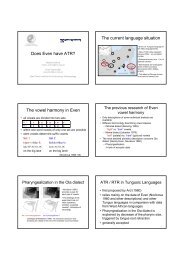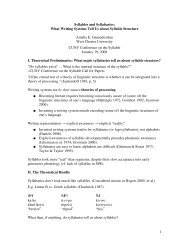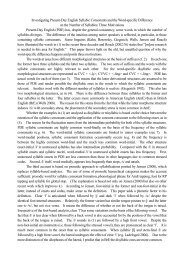- Page 1:
The Contrastive Hierarchy in Phonol
- Page 4 and 5:
course with Keren Rice at the Cente
- Page 7 and 8:
Table of Contents Acknowledgements
- Page 9:
6.7. Underspecified inputs.........
- Page 12 and 13:
(Chen 1972). In final open syllable
- Page 14 and 15:
For example, given a language in wh
- Page 16 and 17:
difficulty Czech speakers have in r
- Page 18 and 19:
four-vowel system /i, e, a, u/. Eve
- Page 20 and 21:
sonority (say, /a/) and one of less
- Page 22 and 23:
Halle (1959) against the structural
- Page 24 and 25:
former approach, pairwise compariso
- Page 26 and 27:
Chapter 7 presents a series of case
- Page 28 and 29:
these features. And yet, none of th
- Page 30 and 31:
2.2. Contrastive specification by p
- Page 32 and 33:
to /p/, that is, a voiceless nasal
- Page 34 and 35:
collaborators. Rather than make pai
- Page 36 and 37:
. If the set is found to consist of
- Page 38 and 39:
This kind of reasoning, which I wil
- Page 40 and 41:
edundancy, and this conflation of t
- Page 42 and 43:
in (2.13). /p/ is characterized as
- Page 44 and 45:
voiced, and the same holds for [nas
- Page 46 and 47:
The problem of too many features do
- Page 48 and 49:
(2.21) Three-vowel system, features
- Page 50 and 51:
[+back]. The addition of the featur
- Page 52 and 53:
. Specifications according to the p
- Page 54 and 55:
pairwise method. One might reason t
- Page 56 and 57:
the program generated up to 52 colu
- Page 58 and 59:
properly contrastive specifications
- Page 60 and 61:
discussion here, because they inter
- Page 62 and 63:
There are different kinds of binary
- Page 64 and 65:
(2.30) Contrastive specifications:
- Page 66 and 67:
algorithm that assigns feature valu
- Page 68 and 69:
feature ordering, for there is empi
- Page 70 and 71:
contrastive in a given language; th
- Page 72 and 73:
(3.1) Different phonetics, similar
- Page 74 and 75:
the wrong place in the pattern of D
- Page 76 and 77:
c. Consonants obstruent sonorant vo
- Page 78 and 79:
proposing certain contrastive relat
- Page 80 and 81:
The phonologically relevant marks o
- Page 82 and 83:
1. First, divide the inventory by t
- Page 84 and 85:
[T]he opposition d-n (as in French)
- Page 86 and 87:
that these features are contrastive
- Page 88 and 89:
a contrastive hierarchy, but not in
- Page 90 and 91:
only the fact that lips and tip of
- Page 92 and 93:
ts, s, z/ and /k, x, ƒ/, respectiv
- Page 94 and 95:
3.3.3.2. Vowel systems Polabian In
- Page 96 and 97:
(3.14) Triangular system with schwa
- Page 98 and 99:
three vertical sets, as in (3.18).
- Page 100 and 101:
Though the above analysis is the ty
- Page 102 and 103:
In these examples there appears to
- Page 104 and 105:
classify them according to their fu
- Page 106 and 107:
Trubetzkoy’s criteria, variation
- Page 108 and 109:
o o^ O O^ a) e) o) O) ´ Vocality +
- Page 110 and 111:
Subtree (3.28b) depicts the contras
- Page 112 and 113:
Twaddell (1935)…’ 16 Second, th
- Page 114 and 115:
After considering the merits of eac
- Page 116 and 117:
3.6.2. Hockett’s approach in prac
- Page 118 and 119:
decisions here are not arbitrary (t
- Page 120 and 121:
obstruent and sonorant coming secon
- Page 122 and 123:
chapter). I have argued that issues
- Page 124 and 125:
(3.39) Diagnostics used in identify
- Page 126 and 127:
(3.41) Contrast and phonological ac
- Page 128 and 129:
and (2) contrastive features are as
- Page 130 and 131:
emphasis on dichotomies as a fundam
- Page 132 and 133:
implication’ that are ‘universa
- Page 134 and 135:
in the low vowels (0.11121). These
- Page 136 and 137:
they observe that a set of eight ph
- Page 138 and 139:
illustrates that the concept of the
- Page 140 and 141:
esult in all phonemes receiving a v
- Page 142 and 143:
n m n@ r l l’ i u e o a Vocality
- Page 144 and 145:
approach. Perhaps because of this J
- Page 146 and 147:
(4.10) Contrastive hierarchy: Stand
- Page 148 and 149:
acoustics. Halle sets out a number
- Page 150 and 151:
allophonic realizations of phonemes
- Page 152 and 153:
tS S Z k kJ g x j r rJ l lJ vocalic
- Page 154 and 155:
the sonorant l). The rule that chan
- Page 156 and 157:
and redundant features: only the fo
- Page 158 and 159:
Phonological theory, however, did n
- Page 160 and 161:
. Phonological rules i. [ ] [-g] i
- Page 162 and 163:
Stanley (1967: 416) considers the c
- Page 164 and 165:
edundant features. This argument wo
- Page 166 and 167:
equire a different tree in which [s
- Page 168 and 169:
158
- Page 170 and 171:
c. Consonants: velopalatal vs. labi
- Page 172 and 173:
arguments of Bloomfield 1933). Inst
- Page 174 and 175:
ules to which a purely formal evalu
- Page 176 and 177:
nevertheless interact with the phon
- Page 178 and 179:
the rule replacing [m F] as the com
- Page 180 and 181:
(5.4) Markedness matrices for vowel
- Page 182 and 183:
emains /a, i, u/. The vowels /i, u/
- Page 184 and 185:
d. XI [u high] [-high] / Kean prop
- Page 186 and 187:
capture co-occurrence restrictions
- Page 188 and 189:
distinguish between contrastive and
- Page 190 and 191:
manipulates only +/- values, not m/
- Page 192 and 193:
Linking crucially depends on the fe
- Page 194 and 195:
of underspecification theory and le
- Page 196 and 197:
marked on sonorants in the lexicon
- Page 198 and 199:
Kiparsky’s analysis thus mirrors
- Page 200 and 201:
constrain this process by a hierarc
- Page 202 and 203:
RU does not fully adopt the Contras
- Page 204 and 205:
minimality. This leaves us with the
- Page 206 and 207:
Similar results can be shown to be
- Page 208 and 209:
for example, the underlying vowel s
- Page 210 and 211:
5.3.3. Contrastive Specification St
- Page 212 and 213:
(5.31) Pasiego Spanish vowels: Poss
- Page 214 and 215:
all logical redundancies, nor does
- Page 216 and 217:
Hume 1995, Halle 1995), Government
- Page 218 and 219:
.Vocoids laryngeal [spread] [constr
- Page 220 and 221:
5.4.2. Terminal features and the co
- Page 222 and 223:
A fourth difference is that the var
- Page 224 and 225:
Intuitively, the two segments diffe
- Page 226 and 227:
epresentations beyond the needs of
- Page 228 and 229:
218
- Page 230 and 231:
6.2. Optimality Theory OT (Prince a
- Page 232 and 233:
convert the coda into an onset, and
- Page 234 and 235:
eing equal, this implies that a son
- Page 236 and 237:
6.3.2. Contrast as an emergent Kirc
- Page 238 and 239:
6.4. The contrastive hierarchy in O
- Page 240 and 241:
6.4.2. Inputs What should be the in
- Page 242 and 243:
(6.12) Contrastive hierarchy for Cl
- Page 244 and 245:
(6.14) Classical Manchu constraint
- Page 246 and 247:
epresentation because it, too, viol
- Page 248 and 249:
We can mimic the effect of the Pair
- Page 250 and 251: limiting specifications to those th
- Page 252 and 253: and the rest of the features are re
- Page 254 and 255: to adopt privative features, where
- Page 256 and 257: 6.7. Underspecified inputs The noti
- Page 258 and 259: (6.29) Implicational constraints fo
- Page 260 and 261: In (6.31), these constraints are ad
- Page 262 and 263: 252
- Page 264 and 265: (6.17) Full specification of all fe
- Page 266 and 267: (6.21) Underspecification by means
- Page 268 and 269: (6.24) Illicit fully specified inpu
- Page 270 and 271: (6.27) Underspecified input Input:
- Page 272 and 273: 262
- Page 274 and 275: value: the fact that all the alloph
- Page 276 and 277: 7.2.1. Contrast and markedness MCS
- Page 278 and 279: (7.2) Contrastive features for dial
- Page 280 and 281: analysis is ‘abstract’ with res
- Page 282 and 283: universal; we will see in §7.4 tha
- Page 284 and 285: feature [high], the contrastively [
- Page 286 and 287: phonological analysis. This should
- Page 288 and 289: 7.3.2. Implicit feature hierarchies
- Page 290 and 291: elations among features. This is no
- Page 292 and 293: dialects with similar-looking inven
- Page 294 and 295: this burden exists independently of
- Page 296 and 297: (7.12) Classical Manchu vowel syste
- Page 298 and 299: 7.4.1.1. ATR harmony All vowels in
- Page 302 and 303: no surprise, therefore, to see this
- Page 304 and 305: [coronal] is contributed by /i/, bu
- Page 306 and 307: 296 c. Xibe: [low] > [coronal] > [l
- Page 308 and 309: (7.24) Turkish vowel system coronal
- Page 310 and 311: (7.26) ATR harmony: /Q/ alternates
- Page 312 and 313: ordered before one based on place (
- Page 314 and 315: hierarchy we arrived at earlier; in
- Page 316 and 317: (7.37) Role of IO-IDENT[back] (adap
- Page 318 and 319: contrastive features to the stem-fi
- Page 320 and 321: (7.40) Pasiego metaphony does not a
- Page 322 and 323: O/, but its scope is limited to the
- Page 324 and 325: one step further, arguing that the
- Page 326 and 327: spreading [high] to a mid vowel uns
- Page 328 and 329: (7.47) Bumo Izon labial and alveola
- Page 330 and 331: and, in the framework of generative
- Page 332 and 333: French contrastive feature hierarch
- Page 334 and 335: (7.54) NZ Ma#ori adaptation of Engl
- Page 336 and 337: obstruent, not /k/: /h/ is not sono
- Page 338 and 339: While the contrastive hierarchy has
- Page 340 and 341: fundamental perceptual-cognitive bu
- Page 342 and 343: their perceptual system to the cont
- Page 344 and 345: figure in the phonology. I conclude
- Page 346 and 347: the postlexical or phonetic compone
- Page 348 and 349: However, when /r&/ devoices it does
- Page 350 and 351:
340
- Page 352 and 353:
342
- Page 354 and 355:
theory is indirectly sensitive to t
- Page 356 and 357:
Constraint (8.1a) provokes labial h
- Page 358 and 359:
8.3. Dispersion-theoretic approache
- Page 360 and 361:
evaluation of phonetic distance app
- Page 362 and 363:
specified [+back]. The vowels /i/ a
- Page 364 and 365:
change, traditionally known as the
- Page 366 and 367:
primarily signalled by the second v
- Page 368 and 369:
fronting. To implement this idea fo
- Page 370 and 371:
allophone of /i/, as shown in (8.13
- Page 372 and 373:
In the analysis sketched above what
- Page 374 and 375:
emerge as one of the five contrasti
- Page 376 and 377:
give the correct results for any ar
- Page 378 and 379:
vowel [ˆ] as having 100% of the co
- Page 380 and 381:
as noncontrastive for [back], the a
- Page 382 and 383:
on). Of the possible potential clas
- Page 384 and 385:
symmetrical. The choice of a featur
- Page 386 and 387:
(Broe 1993, Frisch 1996), I have gi
- Page 388 and 389:
(8.23) Features for Bumo Izon stops
- Page 390 and 391:
(8.26) Similarity measures for Hawa
- Page 392 and 393:
essentially the same as the one ass
- Page 394 and 395:
Clements argues that the robustness
- Page 396 and 397:
feature specifications, a major wea
- Page 398 and 399:
observed by Stevens, Keyser & Kawas
- Page 400 and 401:
there are vowels that are [+high, -
- Page 402 and 403:
. Features that make each other log
- Page 404 and 405:
[round] > [back] (8.38b). This may
- Page 406 and 407:
and contradicts the intuition, shar
- Page 408 and 409:
Thus, the lack of voiced sonorants
- Page 410 and 411:
uniting phonologists who do not oth
- Page 412 and 413:
short back (or central) low vowel i
- Page 414 and 415:
In a hierarchical conception of con
- Page 416 and 417:
406
- Page 418 and 419:
These two concepts have not always
- Page 420 and 421:
410
- Page 422 and 423:
Archangeli, Diana and Douglas Pulle
- Page 424 and 425:
Bolognesi, Roberto (1998). The phon
- Page 426 and 427:
Cherry, E. Colin, Morris Halle and
- Page 428 and 429:
Linguistics (Special Issue on Contr
- Page 430 and 431:
Association, 82-93. Département de
- Page 432 and 433:
Fikkert, Paula (1994). On the Acqui
- Page 434 and 435:
Hall, Beatrice L. and R. M. R. Hall
- Page 436 and 437:
Heffernan, Kevin (2007). The role o
- Page 438 and 439:
Itô, Junko and Armin Mester (1986)
- Page 440 and 441:
Kaisse, Ellen M. and Patricia A. Sh
- Page 442 and 443:
Kuhl, Patricia, K. A. Williams, Fra
- Page 444 and 445:
Martinet, André (1960). Éléments
- Page 446 and 447:
Paradis, Carole (1988). On constrai
- Page 448 and 449:
Radis&ic@, Milica (2007). Velar /g/
- Page 450 and 451:
Rose, Sharon (1993). Coronality and
- Page 452 and 453:
Steriade, Donca (1995). Underspecif
- Page 454 and 455:
Walker, Rachel (2001). Round licens



